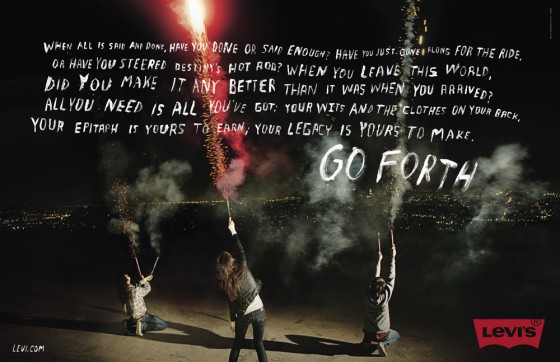I’m sure many of you have seen this Levi’s commercial that was recently released. If you watch Hulu a lot, I know they’ve been featuring it on there for the past week. The commercial is a part of the “Go Forth” series of commercials they’ve been releasing for the past few years.
I think this commercial sheds light on 20-something culture better than anything else I’ve seen in a while.
The text is from a poem written quite a while ago, surprisingly. Here is the text from that poem:
The Laughing Heart
by Charles Bukowski
your life is your life
don’t let it be clubbed into dank submission.
be on the watch.
there are ways out.
there is a light somewhere.
it may not be much light but
it beats the darkness.
be on the watch.
the gods will offer you chances.
know them.
take them.
you can’t beat death but
you can beat death in life, sometimes.
and the more often you learn to do it,
the more light there will be.
your life is your life.
know it while you have it.
you are marvelous
the gods wait to delight
in you.
Some of key themes I see being presented in the video and themes that are well-represented in 20-somethings today are: leading a revolution, sacrificing for a cause, seeking a full life, and making history.
We’re all on a search for the same things. True life. Significance. Meaning. Purpose.
Where we look for those things ultimately decides who finds them though.
I’d say the worldview depicted in the video and poem is troubling at best. This idea that “the gods” are waiting on us fits within our self-actualizing culture that seeks ways to find the next level of fulfillment when the current one wears off. The natural tendency of most Christians is to declare it evil and start boycotting Levi’s products or something else ridiculous like that.
However, in the midst of this poem I do see truth. The truth is that in the eyes of God we are marvelous, and He is a light though often clouded in our world. The more we search for Him, the more we find the Light which brings life.
So take heart, even in a world that does everything it can to squelch out the true light, pieces of the truth still find a way to the audience of the world. Some would call this “common grace” and I think we’d find it a lot more often if we only allowed our eyes and minds to see it.
What do you learn about our culture from the commercial?
